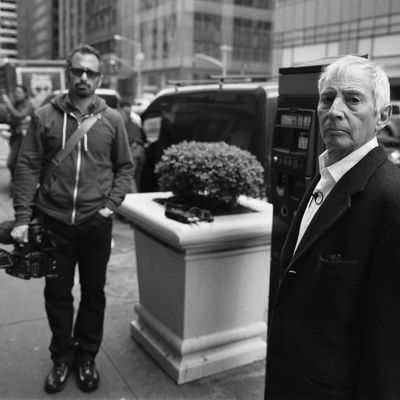
The Jinx, the latest from┬áCapturing the Friedmans┬ádirector Andrew Jarecki, is being sold as an HBO series rather than a documentary. ThatÔÇÖs a sensible┬ádecision, but it also hints at why itÔÇÖs such a irksome piece of work.
The miniseries retells the story of accused murderer Robert Durst, part of the Durst clan of Manhattan real-estate moguls. That in itself isnÔÇÖt noteworthy. Anyone whoÔÇÖs fascinated by true crime probably knows at least some of the details. The first installment, which airs Sunday, rehashes the 2001 murder and dismemberment of Galveston, Texas, resident Morris Black, and the 1982 disappearance of DurstÔÇÖs then-wife Kathleen McCormack, who had warned friends that Durst was a cold, controlling, frightening person. It avoids getting into another murder that some have attributed to Durst: the 2000 shooting in Benedict Canyon, California, of DurstÔÇÖs friend Susan Berman, who was on the verge of telling New York Police what she claimed was new information about┬áMcCormackÔÇÖs disappearance.
What is noteworthy is the onscreen presence of Durst himself. He contacted Jarecki after seeing his 2010 film All Good Things, a drama loosely based on Durst, and ended up agreeing to sit for a series of conversations with the filmmaker. HBO only made the first two episodes of┬áThe Jinx┬áavailable for review, so I canÔÇÖt judge the totality the series. But what IÔÇÖve seen is troublesome, and not in a good way.
Legally speaking ÔÇö and somewhat incredibly, given the overwhelming evidence ÔÇö Durst canÔÇÖt be called a murderer. Although he admitted to dismembering BlackÔÇÖs body with a paring knife, two saws, and an ax during his 2003 trial, the jury acquitted him. (As defense attorney Gary Fischetti told New York, ÔÇ£This is not some sort of scientific finding of guilt or innocence. TheyÔÇÖre not saying he was innocent. TheyÔÇÖre saying that with what they were given for proof, it wasnÔÇÖt done.ÔÇØ)
But Durst is still a vile presence, and unlike other nonfiction films built around people who are definitely or very likely responsible for other peopleÔÇÖs violent deaths ÔÇö such as Errol MorrisÔÇÖs┬áThe Fog of War┬áand Robert OppenheimerÔÇÖs┬áThe Act of Killing┬áÔÇö you never get the sense that the filmmaker is pushing beyond prurient interest to uncover a deeper truth, much less discovering something within the subject that makes him seem theoretically redeemable, or at least recognizably human.
In┬áThe Jinx, as in his trial and in various public statements, Durst just comes across as yacht-club scum, detached by his wealth from anything resembling empathy, peering down at the rest of us plebes from a ledge in Mordor. ThatÔÇÖs cinematic, I guess. But a little of it goes a long way, and if youÔÇÖre going to make what amounts to a real-life┬áInterview With the Vampire, it helps if your subject has a life thatÔÇÖs fascinating apart from the crimes heÔÇÖs accused of. In┬áThe Jinx, Durst never comes across as anything more than an emotionally defective man who radiates entitlement: an old-guy version of Pete Campbell from┬áMad Men, minus the flashes of peevish charm. (When DurstÔÇÖs time among McCormackÔÇÖs relatives is described as ÔÇ£Bob meets the average American family,ÔÇØ he corrects: ÔÇ£More like ÔÇÿBob is forced to spend time with the average American family,ÔÇÖÔÇØ i.e., the family of the wife heÔÇÖs accused of disappearing, and whose surviving relatives are going to see this; what an asshole.)
I should stress again that I havenÔÇÖt seen the whole series, so thereÔÇÖs a (likely remote) possibility that something could happen that will make me reconsider or retract my first impressions. But I should also say that JareckiÔÇÖs┬áCapturing the Friedmans┬ádoesnÔÇÖt give me much hope in that regard. Although it was a critical success and won major awards, I was irritated by how that film took matters of public record and withheld them until the end of the story to create a false sense of suspense and ambiguity. If Jarecki is working a similar ÔÇ£withhold facts to fabricate surpriseÔÇØ structure here, that would be an act of bad faith, especially if DurstÔÇÖs comments mightÔÇÖve added to our understand of his alleged crimes and led to legal closure. But that seems (thankfully) unlikely, because if Durst had confessed on camera or something, weÔÇÖd have heard about it already.
And that leaves is with what, exactly? Several hours up close and personal with Robert Durst, who, based on the footage IÔÇÖve seen, is one of the more tediously revolting men ever to sit for an extended interview. The showÔÇÖs tagline could have been:┬áYouÔÇÖve heard Robert Durst is a horrible person, now see for yourself.┬áItÔÇÖs┬áthe same unspoken come-on that drew people to Barbara WaltersÔÇÖs interview with Robert Blake, and Tom SynderÔÇÖs interview with Charles Manson, but at least Blake and Manson were charismatic, and the broadcasts werenÔÇÖt gussied up with lavish period reenactments and sold as if they were the second coming of┬áIn Cold Blood.


